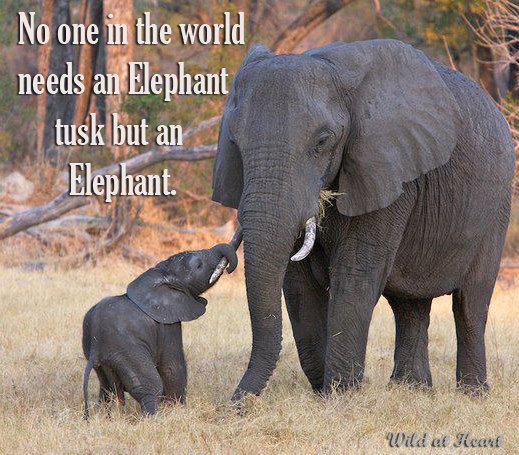When I saw this posting on facebook I knew that would be the subject for this week’s blog.
Ivory from African elephants particularly, but also from Asian elephants, walruses, and narwhal has been used in the past for the white keys on pianos, billiard balls, and decorative items. I inherited a couple of items containing ivory from my mother-in-law, who collected antiques – a group of elephant statuettes, carved out of ebony, with ivory tusks, and a little statuette of a Chinese man with intricate carvings.
I would never sell these items. Not because of sentimental value, but because I know that if there is a market for old ivory items, there is also a market for new items made from poached ivory. I know that, despite the best efforts of many caring people, thousands of elephants have been killed for their ivory every year since trade bans were imposed.
Numbers of African elephants have reduced by such a rate that there are grave fears for populations in many areas, and for the species as a whole.
According to one article I read, the price of ivory in China has increased from $5 to $2,100 per kilogram in 25 years. With incentives like that, it is not surprising that the trade continues to attract poachers.
Although, I believe that governments could be doing a lot more to discourage trade in ivory, I don’t believe that making products illegal has ever stopped their sale. Has making drugs illegal, stopped their sale? What happened during prohibition of alcohol in the USA?
Wherever there is demand, there will be supply. When the supply involves a lot of money, it encourages people to get involved. When the supply is illegal, it encourages criminals to get involved, and criminals, by their definition, are less likely to care who gets hurt in the process.
The illegal trade in ivory has not only resulted in the death of thousands of elephants, but also in the death of a number of rangers who got in the way. I have no doubt that it has also contributed to the corruption of a lot of officials in the process.
Like any of these illegal trades, it is my belief that the best way to reduce the trade is to reduce demand. Whilst educating the purchasers of the suffering involved in the procurement process may reduce demand somewhat, it is my belief that, here, too, the solution is a spiritual one.
People opposed to such a horrible trade are unlikely to consider that the best way to stop the perpetrators is to send them love.
When immersed in love, it is difficult for anyone to look at another being as merely a source of money. When immersed in love, it is easier for perpetrators to feel the love that dwells within themselves, and to understand that that same love dwells within the elephants. When immersed in love, it is quite possible that the perpetrators may have an epiphany and consider the consequences of their actions. And when immersed in love, those buyers who previously had no care for where their desired products originated, may think again and choose differently.
As I considered the uses of ivory and the alternatives available, I was reminded once again of that detested song: “I’m a Barbie girl, in a Barbie world. Life in plastic; it’s fantastic.”
https://www.youtube.com/watch?v=ZyhrYis509A
It reminded me that plastics are not all bad. Plastics have reduced our reliance on a lot of animal products, including ivory. Plastic has been used to create the familiar white surface for wooden piano keys, and for billiard balls. There are thousands of other examples where plastics have been used to replace animal products, from pastry brushes to synthetic fabrics.
Unfortunately, the creation of plastics has largely relied upon the use of petroleum, which, as we all know, is another non-sustainable commodity. The other problem with plastics has been its ability to contaminate the environment, due to its long life and its properties as it decomposes.
This article describes how there are now more plastics made from renewable resources, and some of these products are considered biodegradable.
http://en.wikipedia.org/wiki/Bioplastic
Yet, we know that the damage which plastics do to the environment are not caused by the plastics themselves, but by those people who use them and fail to consider the consequences of their actions. (Plastic thrown into the gutter is washed into the sea. Use of plastic bags which fill up landfills, when recyclables are available.)
Many plastics end up in the digestive tracts of animals such as turtles and seabirds, often causing slow painful deaths.
https://www.youtube.com/watch?v=HN9j0y9bivo
https://www.youtube.com/watch?v=fKBWNVNzaPo
Here, again, the solution is a spiritual one.
Love is the answer to all questions and the solution to all problems. We cannot create the world we desire without employing love in all that we do, and using it to consider the consequences of our actions.
With love, decimation of the elephant population will end. With love, viable alternatives to damaging plastics will be created. And, with love, we will find a way to clean our oceans and our beaches.
With love, all things are possible.


Leave A Comment